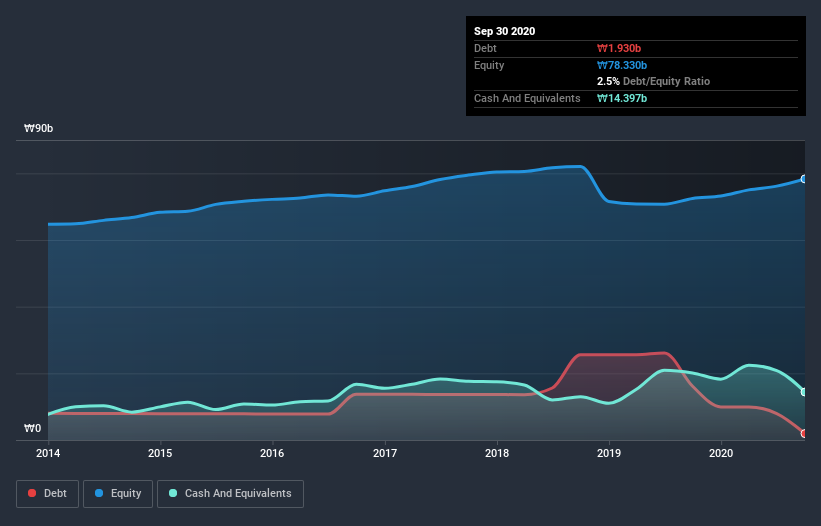- South Korea
- /
- Chemicals
- /
- KOSDAQ:A036640
These 4 Measures Indicate That HRS (KOSDAQ:036640) Is Using Debt Safely

David Iben put it well when he said, 'Volatility is not a risk we care about. What we care about is avoiding the permanent loss of capital.' So it seems the smart money knows that debt - which is usually involved in bankruptcies - is a very important factor, when you assess how risky a company is. We can see that HRS Co., Ltd (KOSDAQ:036640) does use debt in its business. But the real question is whether this debt is making the company risky.
What Risk Does Debt Bring?
Generally speaking, debt only becomes a real problem when a company can't easily pay it off, either by raising capital or with its own cash flow. If things get really bad, the lenders can take control of the business. However, a more common (but still painful) scenario is that it has to raise new equity capital at a low price, thus permanently diluting shareholders. Of course, debt can be an important tool in businesses, particularly capital heavy businesses. The first step when considering a company's debt levels is to consider its cash and debt together.
Check out our latest analysis for HRS
What Is HRS's Debt?
You can click the graphic below for the historical numbers, but it shows that HRS had ₩1.93b of debt in September 2020, down from ₩16.1b, one year before. However, its balance sheet shows it holds ₩14.4b in cash, so it actually has ₩12.5b net cash.

How Strong Is HRS's Balance Sheet?
The latest balance sheet data shows that HRS had liabilities of ₩9.42b due within a year, and liabilities of ₩1.68b falling due after that. On the other hand, it had cash of ₩14.4b and ₩11.7b worth of receivables due within a year. So it actually has ₩15.0b more liquid assets than total liabilities.
This surplus suggests that HRS is using debt in a way that is appears to be both safe and conservative. Given it has easily adequate short term liquidity, we don't think it will have any issues with its lenders. Simply put, the fact that HRS has more cash than debt is arguably a good indication that it can manage its debt safely.
It was also good to see that despite losing money on the EBIT line last year, HRS turned things around in the last 12 months, delivering and EBIT of ₩8.8b. There's no doubt that we learn most about debt from the balance sheet. But you can't view debt in total isolation; since HRS will need earnings to service that debt. So when considering debt, it's definitely worth looking at the earnings trend. Click here for an interactive snapshot.
Finally, a business needs free cash flow to pay off debt; accounting profits just don't cut it. HRS may have net cash on the balance sheet, but it is still interesting to look at how well the business converts its earnings before interest and tax (EBIT) to free cash flow, because that will influence both its need for, and its capacity to manage debt. Over the last year, HRS actually produced more free cash flow than EBIT. There's nothing better than incoming cash when it comes to staying in your lenders' good graces.
Summing up
While it is always sensible to investigate a company's debt, in this case HRS has ₩12.5b in net cash and a decent-looking balance sheet. And it impressed us with free cash flow of ₩11b, being 119% of its EBIT. So we don't think HRS's use of debt is risky. There's no doubt that we learn most about debt from the balance sheet. But ultimately, every company can contain risks that exist outside of the balance sheet. Take risks, for example - HRS has 2 warning signs (and 1 which can't be ignored) we think you should know about.
If you're interested in investing in businesses that can grow profits without the burden of debt, then check out this free list of growing businesses that have net cash on the balance sheet.
When trading HRS or any other investment, use the platform considered by many to be the Professional's Gateway to the Worlds Market, Interactive Brokers. You get the lowest-cost* trading on stocks, options, futures, forex, bonds and funds worldwide from a single integrated account. Promoted
If you're looking to trade HRS, open an account with the lowest-cost platform trusted by professionals, Interactive Brokers.
With clients in over 200 countries and territories, and access to 160 markets, IBKR lets you trade stocks, options, futures, forex, bonds and funds from a single integrated account.
Enjoy no hidden fees, no account minimums, and FX conversion rates as low as 0.03%, far better than what most brokers offer.
Sponsored ContentValuation is complex, but we're here to simplify it.
Discover if HRS might be undervalued or overvalued with our detailed analysis, featuring fair value estimates, potential risks, dividends, insider trades, and its financial condition.
Access Free AnalysisThis article by Simply Wall St is general in nature. It does not constitute a recommendation to buy or sell any stock, and does not take account of your objectives, or your financial situation. We aim to bring you long-term focused analysis driven by fundamental data. Note that our analysis may not factor in the latest price-sensitive company announcements or qualitative material. Simply Wall St has no position in any stocks mentioned.
*Interactive Brokers Rated Lowest Cost Broker by StockBrokers.com Annual Online Review 2020
Have feedback on this article? Concerned about the content? Get in touch with us directly. Alternatively, email editorial-team@simplywallst.com.
About KOSDAQ:A036640
HRS
Engages in the manufacture and sale of silicone products in South Korea.
Flawless balance sheet with solid track record and pays a dividend.
Market Insights
Community Narratives



